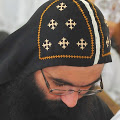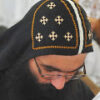“If prayer is fulfilled together with its outward forms, then this is the fulfilment, not only of psalmody, but also of all the virtues.” - St. Isaac the Syrian As part of my duties in the monastery is taking care of the retreat house, so many times I have walked into one of the rooms to …
“If prayer is fulfilled together with its outward forms, then this is the fulfilment, not only of psalmody, but also of all the virtues.”
– St. Isaac the Syrian
As part of my duties in the monastery is taking care of the retreat house, so many times I have walked into one of the rooms to find someone lying down with a Bible in his hand. At first I thought it was a way of getting out of doing work but I eventually realised that it was becoming a common practice among youth in their private prayers to read the Bible laying in bed or at best sitting up on their bed. When I come to speak to them they came up with the most ridiculous excuses such as “I am too tired” or “I concentrate better or isn’t it better to do it while I am comfortable than not to do it at all.” In this article I would like to mention what the church & church fathers had to say about this.
come to speak to them they came up with the most ridiculous excuses such as “I am too tired” or “I concentrate better or isn’t it better to do it while I am comfortable than not to do it at all.” In this article I would like to mention what the church & church fathers had to say about this.
First of all it must be clear that what we do spiritually affects our outward movement of the body and vice versa. For example King David was so spiritually overwhelmed that he could not stop himself dancing in front of the Ark of the Covenant. On this topic, a contemporary monk actually told me once, that if you are not unintentionally moved during prayer, to raise your hand or to prostrate to the ground, then you have not experienced true prayer.
The liturgy of the church teaches us that there are times to stand and a time to prostrate. Before the Gospel reading a deacon calls out “stand up in the fear of God and listen to the Holy Gospel.” Originally the churches did not have pews, you can see this today in the old monastery churches. This is not only so that people would not sit down but also to give them a chance to prostrate to the ground freely during the liturgy. In fact in the fourth century a heresy came out called Messalianism (meaning ‘those who pray’). This heresy rejected the church sacraments, and ascetical practices. They regarded prayer as the only practice through which one reaches different ecstatic states. They also rejected any physical form of prayer such as prostration or even making the sign of the cross. This heresy was rejected by all the fathers of the church. One of the fathers who wrote against this heresy was St. Isaac the Syrian, in an article called “On prayer and its outward forms”.
In this article St. Isaac teaches that outward physical expressions conductive to our inward progress towards pure prayer.
“It is in proportion to the honour which someone shows in his person to God during the time of prayer, both with his body and with the mind, that the door to assistance will be opened for him, leading to the purifying of the impulses’ and to illumination in prayer. Someone who shows a reverential posture during prayer, by stretching out his hands to heaven as he stands in modesty, or by falling on his face to the ground, will be accounted worthy of much grace from on high.”
He further clarifies that the external signs of reverence that we make in our worship are only beneficial to us.
“You should realise, my brethren, that in all our services, God very much wants outward postures, specific kinds of honour, and visible forms of prayer, not for His own sake, but for our benefit. He himself is not profited by such things, nor does He lose anything when they are neglected; rather they are for the sake of our feeble nature.”
But as for those who neglect the outward expression of worship (i.e. messalians) he admonishes saying:
“Many people have despised these outward postures in their thoughts and supposed that prayer of the heart suffices by itself for God, claiming as they lie on their backs or are sitting in a disrespectful manner, that there should only be an interior recollection of God… .This is because they have not perceived the might of the adversary they have, and as a result they are handed over to the working of falsehood, not having understood that they are still mortal and liable to be stirred up by their soul, which is subject to backsliding.”
To conclude, our ‘Bible Reading’ time is not a reading time, but prayer time. The more you treat it that way, the more we will reap its fruits.
Join Us: Sign Up Today!











